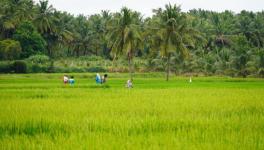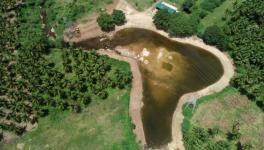COVID-19 In Rural India-XXII: Impact of Lockdown on Shepherd Community in Tamil Nadu
This is the 22nd report in a series that provides glimpses into the impact of COVID-19-related policies on life in rural India. The series, commissioned by the Society for Social and Economic Research, comprises reports by various scholars who have been conducting village studies in different parts of India. This report describes the impact of the nationwide lockdown on the shepherd (Konar) community of Southern Tamil Nadu. The imposition of an unplanned lockdown and the sudden, near-complete ban on transportation and movement has had an adverse impact on the community. This report is based on information obtained from four respondents via telephonic interviews and one respondent via an in-person interview (in Dindigul) conducted between April 14 and April 17. All five respondents belong to the Konar community.
Income of Southern Tamil Nadu’s Konar community largely comes from breeding and rearing sheep; it is their traditional caste occupation. While sheep form the major part of a family’s flock, they occasionally also have a couple of goats or a cow. Households are generally split into two groups: one group that lives a nomadic life, moving with the flock and living in tents or huts wherever they find good grazing and are allowed by landowners to set up their temporary accommodation, and another group (often the elderly) that remains in the family’s native village, tending to the agricultural land and caring for the children of the family.
The nomadic group is typically always on the move, looking to find grazing spots for their livestock. They may stay for as little as two or three days in the same place, or as long as two months. The duration of their stay is decided based on weather conditions and grazing opportunities; these shepherds do not purchase feed for their animals, and so they depend on common lands and agricultural lands to graze their flocks on after the harvest is gathered (such as black gram fields after the crop is harvested at the end of February). The nomadic groups sometimes employ non-family members on a temporary basis to help manage the flock.
Members of the community are sometimes also engaged in agriculture and in the selling of sheep and sheep droppings, both within Tamil Nadu and in the other Southern states.
Impact on economic activity
A typical family maintains a flock of between 75 and 500 sheep. Some families rear animals particularly in order to sell them in the Tamizh months of Chithirai and Vaigasi (mid-April to mid-June), since this is the period in which a number of festivals and weddings typically occur, and there is thus high demand and high prices. An animal that is between seven and 10 months old is normally sold for Rs 4,000 to Rs 4,500 but, during the festive season, the price goes up to Rs 6,000. The demand is such that large-scale sale of animals is also possible in this season. A respondent from Karaikudi was in Pazhakurichi (Nagapattinam district) when the lockdown was announced. As a result, this respondent was forced to stay put, but buyers could not reach the respondent as there was no transport due to the lockdown. According to the respondent: “This lockdown did not favour us; because of no transportation there are no buyers to… [buy] sheep”.
The lockdown has led to a shortage of mutton, especially in larger cities like Chennai and Madurai. A respondent from Alangudi (Pudukkottai district) who was forced to halt at Thirukadivasal in Thiruvarur district specialises in selling sheep when they are relatively young, as these fetch a very good price. In this method of rearing and selling young sheep, the cost of rearing is low and the price realised relatively high. During the lockdown, the sheep could not be sold young, and they will now have to be reared till they are older. Taking into account the cost of rearing and marketing, the respondent has estimated that the loss would be worth about Rs 2 lakh due to having to maintain the herd for longer and his inability to sell at a good price.
Also read: COVID-19 in Rural India-XX: Life on Hold in Tripura
A major source of income is the sale of animal droppings, which are used to fertilise land according to a traditional method. In the villages in Southern Tamil Nadu, this method is called ‘kedai poduthal’, and it involves allowing a flock of sheep to roam an area of agricultural land for a night or two in order to use their droppings as manure. Shepherd families depend on their earnings from kedai poduthal to meet daily expenses while on the move. During the lockdown, the rates for kedai poduthal have dropped from Rs 300 to 400 per night to about Rs 200 per night, according to one respondent.
According to the respondent from Dindigul, buyers from Kerala come to purchase sheep droppings as manure for their banana and areca nut plantations. One bag of droppings (sixty kg) is normally sold at ninety rupees. Since the state borders are sealed, the sale of droppings to buyers from other states has not been possible.
According to the respondent from Karaikudi, the lockdown has also affected the community’s mobility. Each shepherd family normally has a two-wheeler, such as a motorbike, for running errands. The two-wheeler is registered in their home district and goes with them wherever they go. In normal times, two-wheelers passing through towns across districts would remain unnoticed. But, during the lockdown, having a number plate registered in a different district has been a major liability for members of the community who are scattered through the state. Local police harass them and accuse them of moving across districts even when they have not done so.
Impact on agriculture
One of the respondents has seven acres of agricultural land, on which they cultivate cotton and green chillies. The land was being prepared for the sowing of the chilli crop when the lockdown was announced. As a result, additional agricultural labour could not be hired, and the land has presently been left fallow. Preparations for the cotton crop are to begin in early May. The respondent hopes that the lockdown will end by then and that his family can plant their cotton crop.
As the community is used to a nomadic lifestyle, they always have a stock of groceries packed and stored. This stock saw them through to the end of the second week of the lockdown, after which they have found it difficult to get groceries. Two shepherd families that had halted in Thiruvarur approached the district collector on April 13 to help them return to their villages; they received relief packages of rice, pulses and spices on April 15 (before this, they had received some aid from the villagers where they were stranded).
All respondents reported that there has been no strict monitoring of their movements within the villages where they are and no restriction on their use of grazing lands. One of the respondents from Dindigul district said that he had anticipated the lockdown and had quickly transported his flock that was ready for sale to Madurai city just a day before the lockdown began. He said he had managed to sell around fifteen sheep at Rs 500 more than normal market price.
Author is currently doing her MA (Development and Management) from the Madras School of Social Work, Chennai.
Also read: COVID-19 in Rural India-XXI: Agriculture takes a Battering in Bihar's Buxar
Get the latest reports & analysis with people's perspective on Protests, movements & deep analytical videos, discussions of the current affairs in your Telegram app. Subscribe to NewsClick's Telegram channel & get Real-Time updates on stories, as they get published on our website.
























